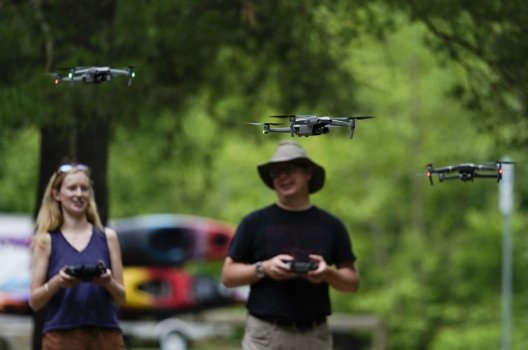When environmentalist Brent Walls saw a milky-white substance in a stream flowing through a rural stretch of central Pennsylvania, he suspected the nearby rock mine was violating the law.
Recent rains had filled the ponds at the mine that allow sediment to settle out of the water, but Walls couldn’t easily take a look because they were surrounded by private property. To quickly investigate and avoid trespassing, Walls captured images of the area with his drone.
“That’s when I found the illicit discharge,” he said. The photo of cloudy liquid flowing into the creek provided evidence Walls used to accuse Specialty Granules LLC of violating the Clean Water Act.
Fifty years after that landmark legislation was signed into law, drones are giving environmentalists a new tool to capture wrongdoing where it is hard to see or expensive to find, though their use to investigate polluters is still pretty rare, Walls said.
He would like them used more often. With the help of a grant, he trains drone pilots for the Waterkeeper Alliance, a global network of clean water groups. The nonprofit wants activists from around the country to know how to use the technology for storytelling and to collect evidence that companies are polluting rivers and streams.
The Clean Water Act allows individuals – not just federal officials – to enforce the law. But citizens who want to use drones to collect evidence must have a federally-issued pilot's certificate and navigate layers of federal, state and local rules.
Walls is the Upper Potomac Riverkeeper and part of a riverkeeper network that has used drones in a handful of other instances to collect evidence of pollution and threaten lawsuits if they aren't satisfied with how companies respond to allegations. Drones were used, for example, to investigate a West Virginia coal operation that allegedly discharged coal residue into a nearby river. Walls said drone footage helped push the company to clean up the site.
On a pleasant, lightly windy day in June, Walls held an in-person training near the fourth hole of Bretton Woods Golf Course just off the Potomac River in Maryland.
Waccamaw Riverkeeper Cara Schildtknecht from the Carolinas coast said it was awesome to be able to finally pilot the drone. “We’ve been training to do this for months,” she said at the in-person training with three other clean water advocates.
Schildtknecht had been through Walls' online courses and passed the test for her pilot’s certificate. After she arrived, she peeled the stickers off her drone. It was her first time flying one.
Walls helped the group ensure their controllers connected properly with their drones before they each had a chance to pilot a practice flight for about 10 minutes.
Continue reading: https://www.wesa.fm/environment-energy/2022-07-02/environmentalists-train-drone-pilots-to-find-and-pursue-pollution
Recent rains had filled the ponds at the mine that allow sediment to settle out of the water, but Walls couldn’t easily take a look because they were surrounded by private property. To quickly investigate and avoid trespassing, Walls captured images of the area with his drone.
“That’s when I found the illicit discharge,” he said. The photo of cloudy liquid flowing into the creek provided evidence Walls used to accuse Specialty Granules LLC of violating the Clean Water Act.
Fifty years after that landmark legislation was signed into law, drones are giving environmentalists a new tool to capture wrongdoing where it is hard to see or expensive to find, though their use to investigate polluters is still pretty rare, Walls said.
He would like them used more often. With the help of a grant, he trains drone pilots for the Waterkeeper Alliance, a global network of clean water groups. The nonprofit wants activists from around the country to know how to use the technology for storytelling and to collect evidence that companies are polluting rivers and streams.
The Clean Water Act allows individuals – not just federal officials – to enforce the law. But citizens who want to use drones to collect evidence must have a federally-issued pilot's certificate and navigate layers of federal, state and local rules.
Walls is the Upper Potomac Riverkeeper and part of a riverkeeper network that has used drones in a handful of other instances to collect evidence of pollution and threaten lawsuits if they aren't satisfied with how companies respond to allegations. Drones were used, for example, to investigate a West Virginia coal operation that allegedly discharged coal residue into a nearby river. Walls said drone footage helped push the company to clean up the site.
On a pleasant, lightly windy day in June, Walls held an in-person training near the fourth hole of Bretton Woods Golf Course just off the Potomac River in Maryland.
Waccamaw Riverkeeper Cara Schildtknecht from the Carolinas coast said it was awesome to be able to finally pilot the drone. “We’ve been training to do this for months,” she said at the in-person training with three other clean water advocates.
Schildtknecht had been through Walls' online courses and passed the test for her pilot’s certificate. After she arrived, she peeled the stickers off her drone. It was her first time flying one.
Walls helped the group ensure their controllers connected properly with their drones before they each had a chance to pilot a practice flight for about 10 minutes.
Continue reading: https://www.wesa.fm/environment-energy/2022-07-02/environmentalists-train-drone-pilots-to-find-and-pursue-pollution

